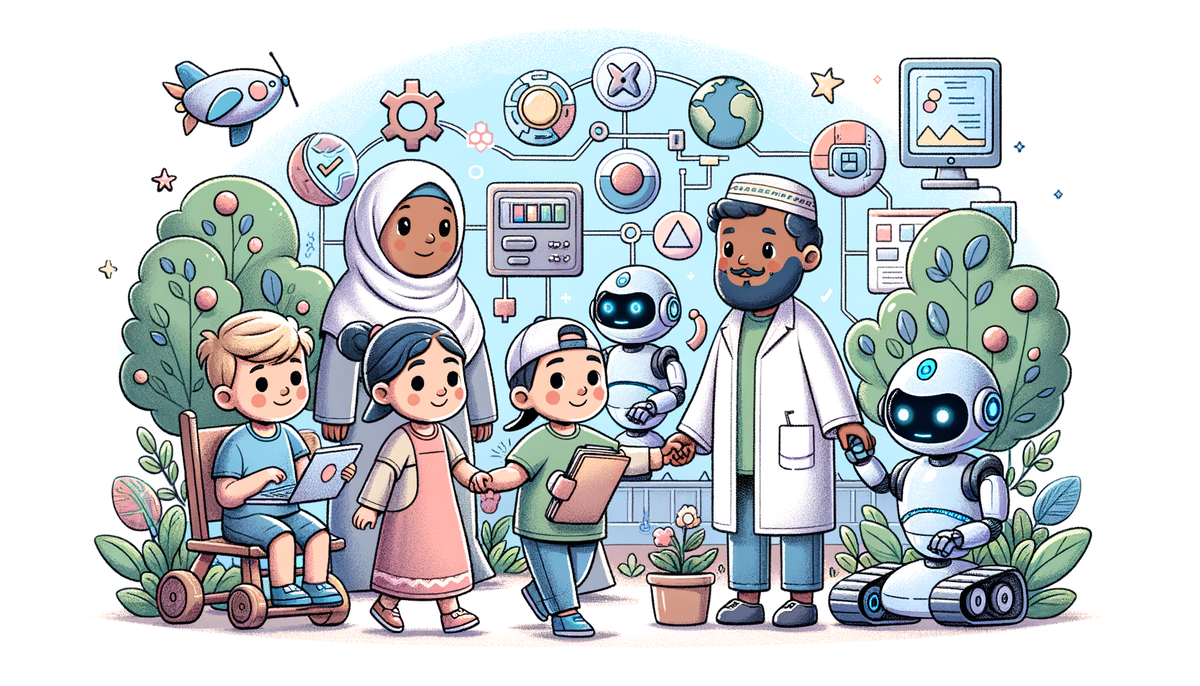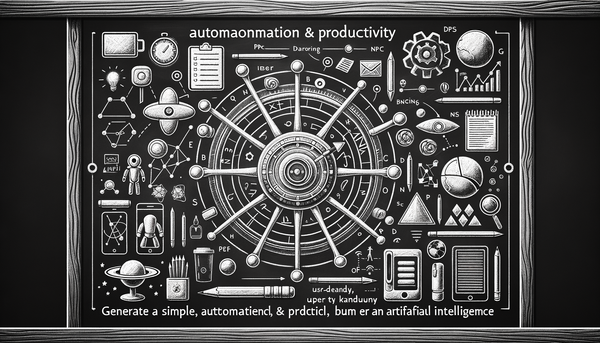AI News: Innovations, Advancements, and Future Directions

In this deep dive into the evolving landscape of artificial intelligence, we explore how Move Digital is set to transform the industry by leading an AI revolution in 2025, how new levels of autonomy are now empowering businesses, how Google’s generative AI toolbox promises to transform data management, and how strategic collaborations like that between MEDIAWEN and Reverie are expanding video accessibility across 11 Indian languages. This article unpacks these exciting breakthroughs while weaving together insights, cross-references with earlier AI developments on AI.Biz, and expert perspectives that range from strategic business implications to cultural inclusivity.
Leading the AI Revolution: Move Digital’s Bold Vision for 2025
The AI industry is rapidly evolving, with companies racing to harness the potential of intelligent systems. One of the brightest stars in this panorama is Move Digital. According to recent coverage on StreetInsider, Move Digital is fast positioning itself as a leader in the AI revolution, with a special focus on expanding its consulting services for family offices worldwide. This expansion signals not only an aggressive growth strategy but also a commitment to delivering high-level strategic insights at a time when AI is permeating nearly every aspect of industry and daily life.
High-Level Consulting Meets Cutting-Edge AI: By targeting family offices—a niche that commands sophisticated asset management and risk assessment—Move Digital is not just providing routine advice. Instead, the company is integrating AI-powered analytics, predictive modeling, and automated decision making to help these organizations navigate complex market terrains. Given the increasing sophistication of investment strategies, particularly as AI begins to redefine risk profiles and financial forecasts, their approach represents a synthesis of technology and traditional wealth management strategies.
This strategic move is reminiscent of past technological revolutions where early adoption and specialization led to long-term competitive advantages. In fact, as one seasoned industry leader quipped,
“Artificial intelligence will reach human levels by around 2029. Follow that out further to, say, 2045, we will have multiplied the intelligence, the human biological machine intelligence of our civilization a billion-fold.”
Although this quote from Ray Kurzweil outlines a futuristic vision, Move Digital’s initiatives hint at tangible near-term transformations.
By bridging the gap between traditional financial services and modern AI capabilities, Move Digital is not just forecasting a smarter future—it is actively constructing it. Their high-level consulting approach, enhanced by advanced AI analytics, is a prime example of how sectors traditionally lagging in technological integration can benefit from intelligent automation.
Moreover, the global nature of these family offices introduces an added layer of complexity, as regional differences, varying regulatory landscapes, and cultural nuances all come into play. The company's international expansion signals that they are not just a local phenomenon but a carrier of a global wave of transformation.
For readers interested in broader AI transformations in business, our article on breakthroughs and investments in AI provides a complementary perspective, highlighting similar trends and the competitive dynamics at play.
Unprecedented Autonomy in the Business Realm
In another corner of the AI landscape, businesses are witnessing a dramatic shift in operational dynamics thanks to unprecedented levels of autonomy. Process Excellence Network recently detailed how today’s AI systems are not just assisting; they are actively empowering companies to operate with minimal human intervention across key functions.
Historically, businesses adhered to structured, hierarchical decision-making processes. However, as AI technologies mature, these roles are being reimagined. With the advent of autonomous robots and intelligent data analytics, modern enterprises can now rely on systems that not only collect data but also interpret and act on it in real time.
Reimagining Decision-Making: Today’s AI platforms can rapidly analyze vast amounts of information—from market trends and consumer behavior to real-time operational data—thus accelerating decision-making and enhancing precision. This evolution is a critical breakthrough as it reduces human error, optimizes resource allocation, and even captures subtle patterns that might elude traditional analysis.
Consider a scenario in a modern retail setting: an AI system monitors global supply chain variations, predicts potential delays, and automatically adjusts procurement strategies accordingly. This not only minimizes operational disruptions but also drives down costs, illustrating how intelligent automation serves as a powerful strategic tool.
In support of this narrative, exploring the world of artificial intelligence on AI.Biz delves deeper into the transformative power of autonomous systems. The integration of AI autonomy is decisively creating business models that are agile, resilient, and competitive in a volatile global market.
“AI is everywhere. It's not that big, scary thing in the future. AI is here with us.” – Fei-Fei Li
This quote by Fei-Fei Li encapsulates the current reality of AI integration in businesses. The coming era of unparalleled efficiency is not a distant, hypothetical eventuality—it is unfolding before our eyes. The application of autonomous AI systems promises real-world benefits across industries from manufacturing and logistics to finance and healthcare.
Moreover, as companies evolve in response to these advancements, there is a clear emerging trend toward end-to-end automation whereby systems are no longer confined to siloed tasks but instead provide holistic solutions that integrate supply chain management, human resources, customer service, and even strategic planning.
As AI systems assume more significant roles, there is also a broader socio-economic debate on the future of work and the significance of human expertise. However, history has repeatedly shown that technological advancements open new avenues for human creativity and innovative endeavors rather than simply displacing jobs.
Revolutionizing Data Management: Google’s Generative AI Toolbox for Databases
Data is often described as the new oil in the digital era, and like oil, its value increases when it can be easily extracted and refined into actionable insights. Google’s recent announcement, as reported in InfoWorld, about its generative AI toolbox for databases stands as a remarkable milestone in this journey. This toolbox is designed to facilitate smoother and more intuitive interaction between agents and databases.
The Promise of Generative AI: At its core, the generative AI toolbox leverages sophisticated natural language processing and machine learning algorithms to help users navigate vast data repositories. In practical terms, it enables non-technical users to interact with databases using everyday language rather than having to master complex query languages. This democratizes access to critical information and allows more individuals within an organization to make data-driven decisions.
The development is particularly noteworthy when considering the traditionally steep learning curve associated with database management systems. For instance, a customer service agent can now quickly retrieve historical customer interaction data by simply asking questions in plain language, rather than depending on a database administrator to execute a query. Such democratization of data access is likely to spur a wave of innovation across departments that were previously data-averse.
This breakthrough also has significant implications in large-scale data environments such as those found in finance, healthcare, and logistics, where timely and accurate data retrieval is crucial. Researchers have noted that when AI solutions are applied to data management, there is often a considerable reduction in time spent on data processing tasks—a critical efficiency gain in high-stakes decision-making processes.
Furthermore, the generative AI toolbox aligns with the broader trend of integrating intuitive, user-friendly AI capabilities into everyday business processes. This trend not only enhances operational efficiency but also fosters a culture of innovation where data-driven insights become accessible to all.
A practical example can be seen in the realm of supply chain management. Consider a system that automatically tracks shipments, predicts potential delays, and optimizes delivery routes solely based on real-time data inputs. Tools like Google’s AI toolbox make such scenarios not only possible but increasingly efficient.
For a more detailed exploration of innovative AI applications that are reshaping industries, our article on AI updates, regulations, and innovations on AI.Biz offers valuable insights into the interplay of technology and business strategy.
Breaking Language Barriers: AI Localization and Expanded Video Accessibility
As digital content consumption surges worldwide, the importance of accessibility has never been greater. MEDIAWEN and Reverie are leading an important initiative to expand video accessibility in 11 Indian languages—a project that heralds the future of AI localization. As reported by PR Newswire, this collaboration leverages artificial intelligence to translate and transcribe video content, making it more inclusive and easing the navigation of language barriers.
Enhancing Inclusivity Through Technology: The goal is to ensure that people who speak Hindi, Bengali, Telugu, and several other prominent Indian languages have equal opportunities to access critical information and entertainment. This development is particularly significant in a country as linguistically diverse as India, where language can often be a barrier to knowledge.
The application of AI-driven localization techniques goes beyond mere translation; it involves context-aware processing capable of capturing cultural nuances and regional specificities. This is a massive leap forward in digital inclusivity. Videos that were once available predominantly in English or other major global languages are now transforming into a kaleidoscope of voices and perspectives.
As media and technology converge, the growth of AI-powered solutions has paved the way for innovations that resonate on social and cultural levels. With artificial intelligence at the helm, the solutions address not only the technical challenges of translation and transcription but also the deeper need to democratize information. This step is also emblematic of the global push toward greater inclusivity—helping bridge the digital divide.
One can imagine an educational platform that uses AI localization to offer courses in multiple languages, significantly broadening access to quality education. Similarly, in entertainment, regional films and news can reach audiences beyond the boundaries of language, fostering greater cultural understanding and exchange.
Our ongoing series on market insights at AI.Biz also illuminates how such breakthroughs not only expand market reach but drive a more connected society. By lowering barriers to entry, technologies like these facilitate economic growth and empower communities.
“I believe AI is going to change the world more than anything in the history of mankind. More than electricity.” – Kai-Fu Lee
Such bold assertions prompt us to reflect on the societal impact of AI localization. Today, the ability to communicate across linguistic divides is more than a technical achievement—it’s a vital step toward realizing a truly global, inclusive digital future.
A Broader Perspective: The Road Ahead for AI and Society
When we look at these transformative developments—from strategic moves by Move Digital to the empowering dynamics of business autonomy, the democratization of data access with Google’s generative AI toolbox, and the socially inclusive strategies of AI localization—one common thread emerges: the undeniable drive toward bridging gaps and overcoming traditional limitations.
In the fast-evolving realm of AI, there is a convergence of technological prowess and a renewed focus on societal impact. Innovations in automation and data management are not simply about efficiency or competitiveness; they are altering the foundations of how we understand, process, and respond to information. For example, the shift towards autonomous decision-making is empowering industries to reconfigure their operational frameworks—leading to new models of work that leverage both human ingenuity and machine precision.
What does this mean for the future of business and society? In many respects, we are witnessing a digital renaissance—a transformative period where traditional boundaries are redefined. The accelerated pace of AI adoption in various sectors is paving the way for economies that are more agile, more data-driven, and more capable of meeting the challenges of a complex global environment.
It is an exhilarating time to observe the intersection of algorithms with everyday life. History shows us that technological revolutions invariably spark debates about ethics, labor, and the role of human judgment. Yet, the examples outlined in these reports remind us that technology, at its best, extends our capacities and enriches our human experience. Whether it is through breaking new ground in financial consulting, streamlining business operations, or promoting inclusivity in media, the applications of AI are as diverse as they are transformative.
Moreover, the integration of AI in various sectors encourages cross-disciplinary collaboration. For instance, the synergy between financial strategy and AI-driven insights in Move Digital’s consulting services is a model for how traditional industries can reinvent themselves through technological innovation. Similarly, AI providing robust support in data management creates opportunities for enhanced research, greater operational transparency, and an overall higher standard of accuracy in decision-making.
Such developments remind me of the early days of the computer revolution—a time when a few pioneering minds had the vision to merge theoretical possibility with practical application. Today, as AI continues to expand its capabilities, we find ourselves at a similar crossroads where bold ideas rapidly become indispensable tools that shape our world.
The ripple effects of these changes are just beginning to be felt. It is increasingly clear that while these innovations present vast opportunities, they also invite us to deliberate on policy, regulation, and ethical use. Balancing progress with responsibility remains a key challenge as industries navigate the integration of AI into critical infrastructures. Yet in this balance lies the promise of a future where technology enriches human capabilities without compromising our core values.
For those who wish to explore these emerging trends further, our AI updates and innovations section continually covers the intersection of technology, regulation, and market dynamics, showcasing how industries are adapting to these rapid changes.
Further Readings and Reflections
The converging paths of Move Digital’s strategic expansion, the empowering rise of AI autonomy in business, revolutionary data management solutions from Google, and transformative AI localization initiatives illustrate a robust ecosystem of innovation that is actively redefining our world. Each of these stories contributes a unique perspective on the effective integration of AI, and together, they underscore the multi-dimensional impact of technological progress.
In exploring these themes, one can recall the wise words of Fei-Fei Li: “AI is everywhere. It's not that big, scary thing in the future. AI is here with us.” This insight reinforces the view that we are not on the shores of a distant future but are already in the midst of a vibrant, ever-changing digital landscape.
As this wave of innovation continues, readers are encouraged to follow the evolving narrative through our dedicated sections on AI breakthroughs, updates, and market insights on AI.Biz. Each story adds a vital piece to the complex puzzle of modern technological advancement—a puzzle that, when complete, illustrates how AI is set to redefine every aspect of business, culture, and society.
Further reading can be found via links on our site, such as the detailed coverage on the latest AI breakthroughs and investments and our explorations into the competitive landscape and market insights. Additionally, insightful discussions and analyses on AI integration can be found in our feature on exploring the world of artificial intelligence, which offers further context and an in-depth look at how AI is transforming every industry.
As we witness these groundbreaking developments, the conversation about the role of AI in society is only just beginning. The harmonization of innovative technology with everyday applications hints at a future where intelligent systems not only support business efficiency but also promote inclusivity, creativity, and global connectivity.
Concluding Observations
In sum, the AI revolution is a tapestry woven from diverse threads of innovation, strategy, and societal influence. Move Digital’s focus on high-level consulting for family offices illustrates an important synergy between traditional financial management and modern AI analytics. Meanwhile, autonomous systems in business are paving the way for operational efficiencies that were once the stuff of science fiction. Google's generative AI toolbox marks a significant stride in simplifying data interactions, and the ambitious localization efforts for video accessibility highlight AI’s potential to unite diverse linguistic communities.
These developments collectively signal that we are on the cusp of a new era where artificial intelligence not only enhances our technical capabilities but also fosters a more inclusive, efficient, and connected society. They remind us that while each innovation carries its own narrative, together they contribute to a larger story of progress, resilience, and transformative potential.
As we move forward, it will be fascinating to see how additional breakthroughs will continue to unfold. One thing remains clear—AI is not just an emerging technology but a defining force of our time, guiding us toward a future replete with both profound challenges and boundless opportunities.
Further Readings
- Move Digital Leads AI Revolution in 2025, Expands High-Level Consulting for Family Offices Worldwide – StreetInsider
- New Age of AI Brings Unprecedented Autonomy to Businesses – Process Excellence Network
- Google’s Generative AI Toolbox for Databases – InfoWorld
- Advancing AI Localization: MEDIAWEN and Reverie Expand Video Accessibility in 11 Indian Languages – PR Newswire



